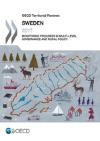Regional development
Publications on Regional Development
- Regional development policy
- Regional innovation
- Rural development
- Urban development
- Statistics and indicators
- Multi-level governance and public finance
- Water governance
- Territorial reviews
|
Regional development policy |
 |
The OECD Regional Outlook 2016 examines the widening productivity gap across regions within countries, and the implications of these trends for the well-being of people living in different places. It discusses how structural policies, public investment and multi-level governance reforms can help boost productivity and address inclusion. Drawing on a survey of OECD countries, the Outlook highlights country practices in regional, urban, and rural development policy that guide public investment. |
 |
Regional Outlook 2014: Where Policies and People Meet Regions and cities are on the front lines of many challenges faced by OECD countries today, from education and jobs to health care and quality of life. Getting regions and cities “right”, adapting policies to the specificities of where people live and work, is vital to improving citizens’ well-being. This second edition of the OECD Regional Outlook aims to help countries do just that. Part I describes the main trends and challenges today. Part II has a special focus on cities, looking at public investment, urban framework policies, and rural-urban issues. Part III presents a Policy Forum on the future of cities, with five contributions from distinguished authors and policy makers. Part IV offers profiles of regional development in all 34 OECD countries. |
 |
OECD Regional Outlook 2011: Building Resilient Regions for Stronger Economies The OECD Regional Outlook 2011 provides an overview of the main developments in performance among OECD regions and the challenges for regional policy after the crisis. The first two chapters present fresh analysis of regional growth and labour-market trends, exploring their implications for policy. This is followed by three chapters offering focused analyses of key policy issues. |
Thematic reports |
|
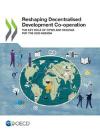 |
This report analyses the evolution of financial flows, emerging trends and innovative paradigms related to the development co-operation of local and regional governments, including but not limited to official development assistance extended by sub-national governments. It promotes a territorial approach to development co-operation and provides policy recommendations to maximise the effectiveness, benefits and outcomes of DDC at all levels, while acknowledging the diversity of approaches, definitions and concepts across OECD DAC countries active in DDC. |
 |
Productivity and Jobs in a Globalised World: (How) Can All Regions Benefit? This report looks at how regional policies can support productivity growth and jobs. It looks at the role of the tradable sector as a driver of productivity growth and the possible risks of a this sector. It considers how regions integrate global value chains and highlights the role of regional and policy links in fostering productivity growth and job creation. |
 |
Working Together for Local Integration of Migrants and Refugees This report describes what it takes to formulate a place-based approach to integration of migrants through concerted efforts across levels of government as well as between state and non-state actors. It draws on both quantitative evidence, from a statistical database, and qualitative evidence from a survey of 72 cities. It draws on both quantitative evidence, from a statistical database, and qualitative evidence from a survey of 72 cities. The report also presents a 12-point checklist, a tool that any city or region – in Europe, the OECD or beyond – can use to work across levels of government and with other local actors in their efforts to promote more effective integration of migrants. |
Expand for more thematic reports
 |
Adopting a Territorial Approach to Food Security and Nutrition Food insecurity and malnutrition are major international concerns, especially in rural areas. At the global scale, they have received considerable attention and investment, but the results achieved so far have been mixed. Some countries have made progress at the national level, but still have many citizens who are food insecure, often concentrated in specific geographic areas. Food insecurity and poverty are highly interlinked and have a strong territorial dimension. This report highlights five case studies and the OECD New Rural Paradigm, presenting an effective framework for addressing food insecurity and malnutrition. |
 |
The devastating earthquake that hit the regional capital L’Aquila and its surroundings on 6 April 2009 caused 309 deaths and was a significant economic shock, jeopardizing the long-term growth prospects of an already vulnerable region. The issues raised in the report can help other governments to rethink regional policy, for both regions vulnerable to natural disasters and for those facing long-term decline. As such, eight guiding recommendations for building resilient regions after a disaster are drawn. These guiding recommendations can provide a framework for policy making in other OECD regions.
|
 |
Promoting Growth in all Regions (2012) This publication highlights the importance of promoting growth in all types of OECD regions, particularly in underdeveloped ones. Helping underdeveloped regions to catch up will have a positive impact on a country’s national growth; in some cases more so than in already well-developed regions. Examinations of patterns of growth reveal that underdeveloped rural and intermediate regions tend to grow faster. This publication is based on anlaysis among all OECD regions and 23 case study regions from ten OECD countries over the period 1995-2007. |
 |
Regional Development Policies in OECD Countries (2010) This report is the first systematic, comparative analysis of OECD countries’ regional policies. It addresses fundamental regional policy concerns, such as: problem recognition; the objectives of regional policy; the legal/institutional framework; the urban/rural framework; budget structures; and the governance mechanisms linking national and sub-national governments as well as sectors. The report will help countries to better understand regional policies and to formulate and diffuse horizontal policy recommendations. |
 |
How Regions Grow: Trends and Analysis (2009) Regional differences within OECD countries are often greater than those between countries and much inequality remains. This report explores what generates growth at the regional level. Based on in-depth econometric modelling and analyses, this report reframes the debate on regional policy and development, emphasising that opportunities for growth exist in all regions.
|
 |
Regions Matter: Economic Recovery, Innovation and Sustainable Growth (2009) Why do some regions grow faster than others, and in ways that do not always conform to economic theory? This is a central issue in today’s economic climate, when policy makers are looking for ways to stimulate new and sustainable growth. OECD work suggests that there is no one-size-fits-all answer to regional growth policy. Rather, regions grow in very varied ways and the simple concentration of resources in a place is not sufficient for long-term growth. This report draws on OECD analysis of regional data (including where growth happens, country-by-country), policy reviews and case studies. |
|
Regional innovation |
|
 |
Regions and Innovation: Collaborating Across Borders (2013) This report examines cross-border collaboration on innovation, building on case studies of cross-border areas that include the following countries: Finland, Sweden, Norway, Estonia, Denmark, Germany, Netherlands, Belgium, United Kingdom and Ireland. |
Expand for more thematic reports
 |
Regions and Innovation Policy (2011) Regions and Innovation Policy addresses the needs of national and regional governments for greater clarity on how to strengthen the innovation capacity of regions. The first part of the book examines strategies, policies and governance, explaining why regions matter, what makes smart policy mixes, and multilevel governance. The second part of the book looks at agencies, instruments and country information, showing how agencis can maximize their impact and what policy instruments work. The final chapter provides country-by-country summaries of what countries are doing. |
 |
Globalisation and Regional Economies: Can OECD Regions Compete in Global Industries? (2007) National and regional governments in OECD countries are looking for ways to ensure that regions maintain a competitive edge in industries that generate wealth and jobs. This report looks at how different regions are responding to these challenges and the strategies they have adopted to support existing competitive advantages and to transform their assets to develop new competitive strengths.
|
 |
Competitive Regional Clusters: National Policy Approaches (2007) In today’s globalising world, the regional specialisations built up over decades are transforming rapidly. Many regions that were historically production centres in a given sector are losing out to lower-cost locations and reorienting to higher value-added niches. National programmes to promote cluster-based approaches -- linking firms, people and knowledge at a regional level - are being used to meet the challenge. This report analyses the objectives, targeting, instruments and inter-governmental role sharing used by 26 programmes in 14 OECD countries. It will be of interest to policy makers, researchers, firms and others active in promoting innovation and competitiveness.
|
 |
Building Competitive Regions (2005) In recent years, the main focus of territorial policy has been on sustaining growth, not only to address relative decline, but also to make regions more competitive. Putting this in practice is complicated because different regions have different characteristics (urban, intermediate, industrial, rural, etc.), which imply specific policy and investment needs. This report assesses the strategies pursued by OECD member governments to address the competitiveness of regional economies and the accompanying governance mechanisms on which the implementation of these strategies rests. The report is principally based on findings from the series of reviews undertaken by the OECD Territorial Development Policy Committee at national and regional levels.
|
OECD Regions at a Glance serStatistics and indicators |
|
 |
Divided Cities: Understanding Intra-urban Inequalities This report provides an assessment of spatial inequalities and segregation in cities and metropolitan areas from multiple perspectives. The report also discusses methodological alternatives for measuring different dimensions of inequality and segregation across cities, and highlights the role of public policies in bridging urban divides and the relevance of the scale of analysis in order to make sound international comparisons. |
 |
The Geography of Firm Dynamics: Measuring Business Demography for Regional Development This report provides methods and data to measure and analyse business demography across OECD regions.It also provides a tool for national and local policy makers to design strategies for healthier business environments that are tailored to the specific characteristics of each region, thereby boosting prosperity. |
 |
Making Cities Work for All: Data and Actions for Inclusive Growth
This report provides ground-breaking, internationally comparable data on economic growth, inequalities and well-being at the city level in OECD countries. It provides empirical evidence on how cities are diverging from, or converging with, other parts of the country, and of the extent of inequality within cities. Finally, it proposes a framework for action, to help national and local governments reorient policies towards more inclusive growth in cities – a new approach to growth that ensures that no part of society is left behind. |
 |
This report provides a comprehensive picture of well-being in the major Danish cities, by looking at a wide range of dimensions that shape people’s lives. It contains both objective and subjective indicators meant to help policy makers, citizens and other stakeholders to better understand living conditions not only among cities but also among the different neighbourhoods within cities. This information can help policy makers build a development strategy based on well-being metrics, and choose the courses of action that will make the most difference in people’s lives.
|
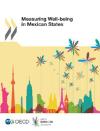 |
Measuring Well-being in Mexican States The report provides a comprehensive picture on the territorial differences in many well-being dimensions across the 31 Mexican states and the Federal District. It represents a sound base for state and local policy makers, political leaders and citizens to better understand people’s living conditions, gauge progress in various aspects of economy and society and use these indicators to improve the design and implementation of policies. It is a part of the “How’s Life in Your Region?” work produced by the OECD Public Governance and Territorial Development Directorate at the behest of the Regional Development Policy Committee. |
 |
How's Life in Your Region: Measuring Regional and Local Well-being for Policy Making This report paints a comprehensive picture of well-being in the 362 OECD regions, by looking at some of the most important aspects that shape people’s lives: jobs, income, housing, education, health, access to services, environment, safety and civic engagement. The report finds that the disparities in material conditions and quality of life are often greater among regions within the same country than they are across different countries. It provides a common framework for measuring well-being at the regional level and guidance for all levels of government in using well-being measures to better target policies at the specific needs of different communities drawing from a variety of practical experiences from OECD regions and cities. An interactive web-based tool (www.oecdregionalwellbeing.org) allows to compare performance across regions in OECD countries and monitoring improvements over time. |
|
|
Redefining "Urban": A New Way to Measure Metropolitan Areas (2012) This report compares urbanisation trends in OECD countries on the basis of a newly defined OECD methodology which enables cross-country comparison of the socio-econimic and environmental performance of metropolitan areas in OECD countries. The methodology is presented and results from its application to 27 OECD countries are discussed together with policy implication both on national growth and governance of cities. The report also includes three original papers that present the urbanisation dynamics and prospects in China and South Africa and the governance challenges resulting from the new policy agenda on cities in the United Kingdom. |
OECD Regions at a Glance series |
|
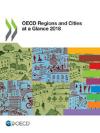 |
OECD Regions and Cities at a Glance: 2018 Edition This report looks at how regions and cities across the OECD are progressing towards stronger economies, higher quality of life for their citizens and more inclusive societies. This edition presents regional and metropolitan updates for more than 40 indicators to assess disparities within countries and their evolution since the turn of the new millennium. The report covers all OECD countries and, where data is available, Brazil, People’s Republic of China, Colombia, Lithuania, Peru, the Russian Federation, Tunisia and South Africa. The full series of OECD Regions at a Glance is available on OECD iLibrary. |
|
multi-level governance and public finance |
|
 |
Making Decentralisation Work - A Handbook for Policy-Makers This report offers a comprehensive overview of decentralisation policies and reforms in OECD countries and beyond. Sometimes called a “silent” or “quiet” revolution, decentralisation is among the most important reforms of the past 50 years. The report argues that decentralisation outcomes – in terms of democracy, efficiency, accountability, regional and local development – depend greatly on the way it is designed and implemented. Making the most of decentralisation systems is particularly crucial in the context of a “geography of discontent” and growing divides between places that feel left behind by globalisation and technological change and those that may benefit from the opportunities offered by megatrends. The report identifies 10 guidelines for making decentralisation work and allowing it to be conducive to regional development. Beyond the guidelines, the report proposes concrete tools for policy-makers, including detailed sets of recommendations, checklists, pitfalls to avoid and examples of good practices, both in unitary and federal countries.
|
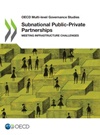 |
OECD Subnational Public Private Partnerships: Meeting Infrastructure Challenges This report focuses on the challenges of governing infrastructure investment and public-private partnerships (PPPs) at the subnational level. In a tight fiscal environment, it is critical to diversify sources of financing for infrastructure investment and PPPs represent an alternative to traditional government procurement with the potential to improve value for money. However, PPPs are complex and sometimes risky arrangements that require capacity that is not always readily available in government, in particular at the subnational level. The report examines the challenges of using PPPs at the subnational level and ways to address them. It does so by focusing on three case studies: subnational PPPs in France, local Private Finance Initiative (PFI) projects in the United Kingdom, and PPPs in Virginia (United States). |
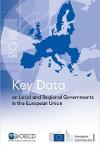 |
OECD Key Data on Local and Regional Governments in the European Union
Published with the support of the European Commission, the booklet presents the 2017 figures on subnational government organisation, size and reforms as well as on subnational finance, including expenditure, investment, revenues, budget balance and debt in the 28 EU member States. It includes data on the implementation of EU financing 2014-20. European regions and cities account for 33% of public expenditure, 51% of public staff spending, 44% of public procurement and 52% of public investment while they represent 24% of public tax revenues and 15% of public debt. |
 |
Maintaining the Momentum of Decentralisation in Ukraine This report addresses regional performance and disparities in Ukraine, provides insight into Ukraine’s current territorial reform and approach to decentralisation, explores the impact of fiscal decentralisation measures, and includes a case study of the transport sector. It also provides a set of recommendations for action to support Ukraine in meeting the conditions for successful decentralisation. |
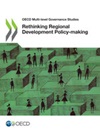 |
Rethinking Regional Development Policy-making This report takes stock of discussions held during a series of seminars organised in 2017 by the OECD and the European Commission that focused on opportunities to improve the design and delivery of regional development policies. Bringing together frontier economic theory and country practices regarding performance frameworks, financial instruments, policy conditionalities, contractual arrangements and behavioural insights in regional policy, this report identifies cross-cutting lessons to help policy-makers manage common trade-offs when designing public expenditure and investment programmes for the development of regions and cities. |
 |
Subnational Governments in OECD Countries: Key Data This statistical brochure provides key data on subnational governments structure and finance in the 35 OECD member countries: number of subnational governments by level and municipal size, expenditure, including by economic function, investment, revenue, tax revenue, budget balance and debt. Access the data: http://stats.oecd.org/Index.aspx?DataSetCode=SNGF
Contact: Isabelle.chatry@oecd.org |
 |
Subnational governments around the world: Structure and finance The OECD and United Cities and Local Government (UCLG) have decided to join forces to prepare this statistical study launched in October 2016 at the UCLG Summit in Bogota. It is a first attempt to build a systematic data compilation on local finances on across the world, based on quantitative and qualitative data. This study presents the main organisational and financial indicators related to subnational governments in 101 federal and unitary countries worldwide. |
 |
Multi-level Governance Reforms: Overview of OECD Country Experiences This report provides an overview of “multi-level governance” reforms in OECD countries. It looks at institutional reforms, which reorganise powers, responsibilities and resources across levels of government, as well as territorial reforms, which address territorial structures, often modifying regional and local government administrative areas.
|
 |
Making Decentralisation Work in Chile - Towards Stronger Municipalities This report provides a comprehensive analysis of the challenges confronting Chile’s centralised growth model and recommendations towards developing a more integrated territorial approach, capable of mobilising regional productivity catch-up potential in order to strengthen the role of regions and municipalities. |
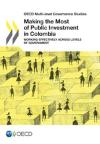 |
Making the Most of Public Investment in Colombia: Working Effectively across Levels of Government This study examines the multi-level governance framework for public investment in Colombia. It provides a diagnosis of the strengths and challenges of the Colombian system and includes comparative data and a set of benchmarks to promote exchange of good practices and promote learning.
|
 |
Making the Most of Public Investment in the Eastern Slovak Republic The Slovak Republic has undergone significant change in the past decade. While growth has been impressive compared to OECD countries overall, but benefits have not accrued equally across the country. This study provides recommendations to make the most of public investment in the Slovak Republic. |
| |
Effective Public Invesment Toolkit The "Toolkit" is an on-line resource providing implementation guidance for the OECD Recommendation on Effective Public Investment Across Levels of Government. It supports both implementation and peer learning, with indicators and good practices from countries, regions, and municipalities. |
 |
This paper explores the institutional ability of SNGs to influence their fiscal space for public investment. In this context, it also analyses the main challenges to be faced by SNG finances in the decades to come, as well as recent reforms implemented by SNGs to tackle these specific issues. |
 |
This article analyses the different factors affecting sub-national governments’ fiscal space for public investment. It proposes an indicator for measuring this fiscal space and analyses the evolution of its different components over 2007-12. |
 |
Investing Together: Working Effectively Across Levels of Government (2013) This report dissects the relationships different government actors form vertically, across levels of government, and also horizontally, across both sectors and jurisdictions. Sub-national actors also need to be equipped with the right skills and resources to carry out their responsibilities and to engage with stakeholders, across the public, private and civil society sectors. This report offers a toolkit to policy makers to assess their needs for capacity development. |
 |
Reforming Fiscal Federalism and Local Government: Beyond the Zero-Sum Game (2012) This book describes and examines reforms of fiscal federalism and local government in ten OECD countries implemented over the past decade. The country chapters identify common patterns and factors that are conducive to reforms of the intergovernmental fiscal framework, using a common methodological approach. The summary chapter highlights the cross-cutting issues emerging from the country chapters and shows the key factors in the institutional, political, economic and fiscal areas that are supporting reform success. The report’s approach results in valuable insights for policy makers designing, adopting and implementing fiscal federalism and local government reforms. |
 |
Institutional and Financial Relations across Levels of Government (2011) This report provides an overview of the institutional and financial relations across levels of government that enables policymakers evaluate their position and identify good practices for mobilising sub-central governments for national growth, equity and stability objectives. This report is divided into two parts: the first part is analytical and the second part provides institutional and quantitative country information and comparisons.
|
 |
This report provides an overview of challenges met in the implementation of investment recovery strategies across levels of government and highlights good practices and lessons learned, focusing on eight country cases: Australia, Canada, France, Germany, Korea, Spain, Sweden and the United States.
|
 |
Governing Regional Development Policy: The Use of Performance Indicators (2009) This report examines both the challenges and the opportunities associated with designing and using indicator systems as a tool for the governance of regional development policy. It draws on the experiences of a number of OECD countries and provides an in-depth look at the cases of Italy, the United Kingdom (England), the United States and the European Union. It builds on previous OECD work on the governance of regional development policy by extending lessons about contractual relations among levels of government to performance indicator systems. |
 |
Linking Regions and Central Governments: Contracts for Regional Development (2007) This book offers a unique analytic framework for assessing multi-level governance arrangements, which is subsequently applied to five case studies of regional development policy: Canada, France, Germany, Italy, and Spain. The book reveals the importance of contractual arrangements for customised management of interdependencies, for clarifying responsibilities among actors, for dialogue, and for learning. |
|
water governance |
|
Thematic reports |
|
 |
Implementing the OECD Principles on Water Governance Water and its improved governance are critical for economic growth, social inclusiveness and environmental sustainability. Three years after the adoption of the OECD Water Governance Principles, this report takes stock of their use and dissemination. It provides a water governance indicator framework and a set of evolving practices for bench-learning, building on lessons learned from different countries and contexts. Based on an extensive bottom up and multi-stakeholder process, these tools are conceived of as voluntary methodologies to be carried out at country, region, basin and/or city levels to improve water policies. |
Expand for more thematic reports
 |
Water Governance in Cities (2016) Building on a survey of 48 cities in OECD countries and emerging economies, the report analyses key factors affecting urban water governance, discusses trends in allocating roles and responsibilities across levels of government, and assesses multi-level governance gaps in urban water management. It provides a framework for mitigating territorial and institutional fragmentation and raising the profile of water in the broader sustainable development agenda, focusing in particular on the contribution of metropolitan governance, rural-urban partnerships and stakeholder engagement.
|
 |
Stakeholder Engagement for Water Management This report assesses the current trends, drivers, obstacles, mechanisms, impacts, costs and benefits of stakeholder engagement in the water sector. It highlights the increasing importance of stakeholder engagement in the water sector as a principle of good governance and the need for better understanding of the pressing and emerging issues related to stakeholder engagement. This report provides pragmatic policy guidance to decision makers and practitioners to help policymakers to set up the appropriate framework conditions needed to yield the short and long-term benefits of stakeholder engagement. |
 |
Water Governance in OECD Countries: A Multi-level approach (2011) This report addresses multilevel governance challenges in water policy implementation and identifies good practices for coordinating water policy across ministries, between levels of government, and across local actors at subnational level. Based on a methodological framework, it assesses the main “coordination gaps” in terms of policy making, financing, information, accountability, objectives and capacity building, and provides a platform of existing governance mechanisms to bridge them. Based on an extensive survey on water governance the report provides a comprehensive institutional mapping of roles and responsibilities in water policy-making at national/subnational level in 17 OECD countries. |
Regional and country studies |
|
 |
Water Charges in Brazil: The Ways Forward This report examines the current system of water abstraction and pollution charges in operation in Brazil. It assesses the current system’s implementation challenges and provides possible solutions. The report explores how water charges can be both an effective means for dealing with water security issues, and a tool for enhancing economic growth and social welfare. |
 |
Water Resources Governance in Brazil This report is the result of a policy dialogue with more than 100 stakeholders at different levels in Brazil. It assesses the performance of Brazil’s water governance and suggests policy recommendations for strengthening the co-ordination between federal and state water policies and for setting up more robust water allocation regimes that can better cope with future risks. The report concludes with an action plan, which suggests concrete milestones and champion institutions to implement those recommendations. |
 |
Water Governance in the Netherlands: Fit for the Future? This report assesses the extent to which Dutch water governance is fit for future challenges, and outlines an agenda for the reform of water policies in the Netherlands. It builds on a year-long policy dialogue with over 100 Dutch stakeholders, supported by robust analytical work and drawing on international best practice. |
 |
Making Water Reform Happen in Mexico (2013) In Mexico, the population is forecast to reach almost 150 million by 2050. Increasing levels of inequality along with the issues caused by climate change are expected to hit hard and exacerbate today's challenges. An additional 36 to 40 million Mexicans will require a water supply and sanitation systems by 2030. For all these reasons, water policy is becoming a national security issue. |
 |
Water Governance in Latin America and the Caribbean (2012)
This report addresses multilevel governance challenges in water policy in the Latin American and the Caribbean (LAC) and identifies good practices for co-ordinating water across ministries, between levels of government, and across local and regional actors. |
|
terRitorial reviews |
|
|
|
Responding to a need to study and spread innovative territorial development strategies and governance in a more systematic way, in 1999 the OECD created the Regional Development Policy Committee (RDPC) as a unique forum for international exchange and debate. The RDPC has developed a number of activities, including a series of national and sub-national Territorial Reviews. This series offers analysis and policy guidance to national and sub-national governments seeking to strengthen territorial development policies and governance. These reviews are part of a larger body of OECD work on regional development that addresses the territorial dimension of a range of policy challenges, including governance, innovation, urban development and rural policy. This work includes both thematic reports and reports on specific countries or regions. These studies follow a standard methodology and a common conceptual framework, allowing countries and regions to share their experiences and disseminate information on good practices. The RDPC forms part of the Centre for Entrepreneurship, SMEs, Regions and Cities network. The full list of Territorial Reviews is available on OECD iLibrary. |
|
urban development |
|
Thematic reports |
|
 |
Global State of National Urban Policy Global State of National Urban Policy is a first attempt to assess the status of national urban policy development in 150 countries. In the report you will understand why, how and in what forms NUPs have been developed,implemented and monitored globally. The report sets a solid foundation for a common methodology to monitor the progress of NUPs at the global level. |
 |
National Urban Policy in OECD Countries This report, prepared for the United Nations Conference on Housing and Sustainable Urban Development (Habitat III), provides an assessment of the state and scope of NUPs across 35 OECD countries. It also describes how urban policy, and its place in national political agendas, is evolving.
|
 |
Urban Transport Governance and Inclusive Development in Korea This report analyses the relationship between urban transport and inclusive development in Korea. First, it looks at how Korea is shifting from car-centered transport towards people-centered mobility. It discusses opportunities and challenges posed by current urban transport arrangements in Korea, and proposes options for improving urban transport governance. Second, the report uses advanced data analysis and space syntax methods to examine how accessibility to public transport shapes inclusiveness in Korean metropolitan areas. Third, it analyses public transport in four selected Korean cities (Seoul, Suwon, Changwon and Sejong), which offer interesting insights into how public transport policies can be tailored to local socio-economic profiles and urban landscapes. |
 |
Road Infrastructure, Inclusive Development and Traffic Safety in Korea
This report combines empirical research on the relationship between road infrastructure, inclusive economic development and traffic safety with an assessment of policies and governance structures to help governments find ways to create effective, safe and inclusive transport infrastructures. |
 |
This book examines trends in ageing societies and urban development and assesses the impact of ageing populations on urban areas as well as strategies for policy and governance responses. The report draws on new quantitative evidence as well as case studies and provides policy makers with insights and tools to mitigate the challenges of ageing societies and make the most of the opportunities they present. |
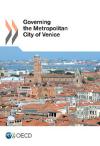 |
Governing the Metropolitan City of Venice Building on the analysis of the OECD Territorial Review of Venice (2010), this report explores the implications for Venice of the adoption in 2014 of new legislation on the governance of metropolitan cities, analysing a number of different "functional geographies" of the larger urban region centred on Venice. The report argues that, although the new legislation offers some opportunities for Venice to address local challenges, it is important to look beyond the Metropolitan City of Venice as defined in the new legislation and to pursue greater governance co-ordination across the larger city region that encompasses Padua, Treviso and Venice (PaTreVe). |
 |
Effective governance of metropolitan areas is crucial for their success. Governance arrangements need to fit local contexts and ensure co-ordination between the different local governments and across complementary policy fields, such as transport and land-use. |
 |
The Metropolitan Century - Understanding Urbanisation and its Consequences The world is experiencing a wave of urbanisation that has the potential to greatly benefit residents, countries and the planet at large. However, benefits do not arise automatically: This report analyses the secrets of successful cities and the policies that contribute to their success. |
 |
The Competitiveness of Global Port-Cities Ports and cities are historically strongly linked, but the link between port and city growth has become weaker. Economic benefits often spill over to other regions, whereas negative impacts are localised in the port-city. How can ports regain their role as drivers of urban economic growth and how can negative port impacts be mitigated? These are the questions that this book aims to answer. |
 |
Towards more inclusive growth in the metropolitan area of Aix-Marseille: International insights This report was prepared in the context of the Ministerial Meeting of the OECD Territorial Development Policy Committee held in Marseille on 5-6 December 2013. The full report is available in French. |
 |
Cities and Climate Change (2010) This book shows how city and metropolitan regional governments, working in tandem with national governments, can change the way we think about responding to climate change. The book also explores policy tools and best practices from both OECD and some non-member countries.
|
Governance of Land Use series
 |
The Governance of Land Use in OECD Countries: Policy Analysis and Recommendations This report argues that better land use governance requires the use of a broader set of public policies to influence land use. In particular, the incentives for particular land uses provided by fiscal instruments and tax policies need to be better aligned with land use objectives. The report furthermore analyses land use patterns across the OECD based on comprehensive land cover data.
|
Expand for more reports on land use
 |
The Governance of Land Use in the Czech Republic: The Case of Prague This report examines land use and governance trends in Prague and the broader metropolitan area, including the formal elements of the planning system and broader governance arrangements such as rural-urban partnerships. It provides a number of recommendations to ensure the sustainable development of regional transportation and infrastructure, affordable housing and quality public amenities. |
 |
Spatial Planning and Policy in Israel: The Cases of Netanya and Umm al-Fahm This report examines spatial planning and policies in Israel. It describes the laws, policies and practices in the country as a whole, and provides a detailed assessment of arrangements and practices in two cities: Netanya, a fast-growing city on the Mediterranean coast; and Umm al-Fahm, the country’s third-largest city with a predominantly Arab population
|
 |
Land-use Planning Systems in the OECD - Country Fact Sheets This report provides an overview of spatial and land-use planning systems across the OECD. It contains country fact sheets that focus on formal aspects of planning systems, as they are defined by laws and regulations. The country fact sheets describe the responsibilities of each level of government with respect to spatial and land-use planning. |
 |
The Governance of Land Use in the Netherlands: The Case of Amsterdam This study examines the social, economic and environmental conditions affecting the area’s spatial development as well as the plans, policies and institutions that govern how land is used. The study offers recommendations on how the city and its metropolitan partners can best respond to emerging challenges and meet their ambitious goals for sustainable and inclusive spatial development. |
 |
The Governance of Land Use in France - Case studies of Clermont-Ferrand and Nantes Saint-Nazaire This report examines how land is governed in France. It describes the laws, policies and practices that shape spatial and land-use planning in the country as a whole, and provides a detailed assessment of specific governance arrangements and practices in two metropolitan areas: Clermont-Ferrand and Nantes Saint-Nazaire. |
 |
Governance of Land Use in Poland This case study of the governance of land use in Lodz illustrates many promising practices and offers guidance on how to make the governance structure and planning system more coherent and robust both in Lodz, and in Poland more generally. This is the first in a series of five case studies on the governance of land use, which will culminate in a synthesis report to be published in 2017.
|
Urban Policy Review series |
|
 |
The series on National Urban Policy Reviews responds to a demand from member countries voiced at meetings of the Regional Development Policy Committee and aims to analyse the role of urban areas in regional development and national performance. National reviews are a leading feature of OECD's mandate and examine macroeconomic, educational, industrial, tax, environmental and regional devleopment policies. The OECD National Urban Policy Reviews seek to provide a comparative synthesis of urban policies in OECF countries focusing on the role of central governments. The full list of National Urban Policy Reviews is available on OECD iLibrary. |
Green Growth series |
|
 |
Urban Green Growth in Dynamic Asia This report discusses how to promote urban green growth in the rapid urbanisation of Southeast Asian countries. In light of the current global debates (SDGs, Paris Agreement & Habitat III), it provides useful insights, not only to Southeast Asian countries, but also to other countries which face similar challenges.
|
Expand for more reports on green growth
 |
Green Growth in Cebu, Philippines Urban green growth policies encourage economic development while reducing negative environmental externalities and the consumption of natural resources and environmental assets. This report is the fourth case study in the OECD Urban Green Growth in Dynamic Asia project. It explores policies and governance systems to promote green growth in Metro Cebu, Philippines, and provides recommendations for enhancing Cebu’s green growth potential. |
 |
Green Growth in Hai Phong, Viet Nam This report examines the green growth potential and identifies best practices for policy and governance as well as ways to strengthen current practices. |
 |
Green Growth in Bandung, Indonesia This report, part of the OECD Urban Green Growth in Dynamic Asia project, explores policies, practices and governance systems to promote green growth in Bandung, Indonesia, and provides recommendations for enhancing Bandung’s green growth potential. |
 |
Green Growth in Bangkok
This publication is the first case study of the Urban Green Growth in Dynamic Asia project. The project explores how to promote green growth in fast-growing cities in Asia by examining policies and governance practices that encourage greening and competitiveness in a rapidly expanding economy. It is part of the OECD Green Growth Studies series, which will culminate in a synthesis report on Urban Green Growth in Dynamic Asia. This report analyses the economic and environmental performance and green growth policy practices of Thailand’s Bangkok Metropolitan Region (BMR). |
 |
Green Growth in Cities (2013) This report synthesises the findings from six case studies of urban green growth policies. It demonstrates the importance of urban policies for achieving national environmental policy goals and discusses the increased efficiency of policy intervention at the urban level. It identifies urban activities to reduce environmental impact that are most likely to contribute to the policy priorities of job creation, urban attractiveness, metro-regional supply of green products and services, and increased urban land values. It also provides guidance on addressing potential financing and governance challenges that may arise in pursuing urban green growth. Finally, the report offers a preliminary proposal for how green growth in cities could be measured. |
 |
Compact City Policies: A Comparative Assessment (2012) This book examines the concept of the compact city and the implication of the current urban context for compact city policies. It explores their potential outcomes, particularly in terms of how it can contribute to Green Growth and looks at developing indicators to monitor compact city and track policy performance. It reviews compact city policies currently being implemented across the OECD in relation to the pursuit of Green Growth objectives and provides ideas to achieve better outcomes. And it assesses the key governance challenges faced by decision-makers as they seek to implement practical compact city strategies. |
 |
Compact City Policies: Korea - Towards Sustainable and Inclusive Growth This report examines Korea's urban policies and offers customised policy recommendations based on the OECD publication, Compact City Policies (2012). |
|
Rural development |
|
 |
Innovation and Modernising the Rural Economy This publication is a result of the discussions from the OECD 8th Rural Development Policy Conference: "Innovation and modernising the rural economy" which took place in Krasnoyarsk, Russia on 3-5 October 2012. It provides an overview of the two themes of modernisation and innovation, focusing on identifying the attributes of the modern rural economy and showing how it differs from the traditional rural economy and from metropolitan economies. It also shows how rural innovation is a key driver of rural economic growth using patents as a measure. |
Expand for more reports on rural policy
|
Rural-Urban Partnerships: An Intregrated Approach to Economic Development (2013) This report provides a framework to understand the changing relationships between urban and rural areas. Specifically, it documents the characteristics of these partnerships and the factors that can hinder as well as enable rural-urban co-operation.
|
|
 |
Linking Renewable Energy to Rural Development (2012) In many OECD countries, governments have invested large amounts of public money to support renewable energy (RE) development and are requiring significant quantities of it to be sold by energy providers. Drawing on case studies in 16 regions within 10 countries, the research finds that while RE indeed represents an opportunity for stimulating economic growth in rural communities, its development benefits are not automatic. Realising them requires a complex and flexible policy framework and a long-term strategy, as well as a realistic appreciation of the potential gains from RE deployment. |
 |
Strategies to Improve Rural Service Delivery This book provides an overview of the underlying problems in delivering services to rural regions. It contains a conceptual structure for thinking about rural service delivery problems and a strategy for thinking about the role of government in service delivery, as well as a discussion of the role that innovation and public management tools like co-design and co-delivery can play in designing better service delivery approaches. Also included are examples of different, successful policy strategies drawn from OECD countries. |
 |
The New Rural Paradigm: Policies and Governance (2006) OECD governments are showing increasing interest in a more place-based approach to rural policy that emphasises investments rather than subsidies and that is able to integrate different sectoral policies and improve the coherence and effectiveness of public expenditure in rural areas. |
OECD Rural Policy Review series |
|
 |
As a subsidiary body of the RDPC, the Working Party on Rural Policy provides government with a forum for discussing regional and rural development. In early 2006, under RDPC's guidance, the Public Governance and Territorial Development Directorate launched a series of national Rural Policy Reviews to deepen international knowledge in this field. The full list of OECD Rural Policy Reviews is available on the OECD iLibrary. |
|
forthcoming publications |
|
|
|
Related Documents



